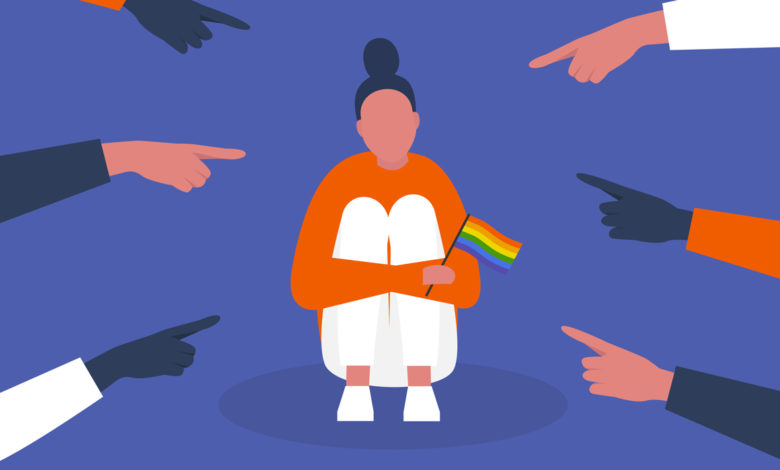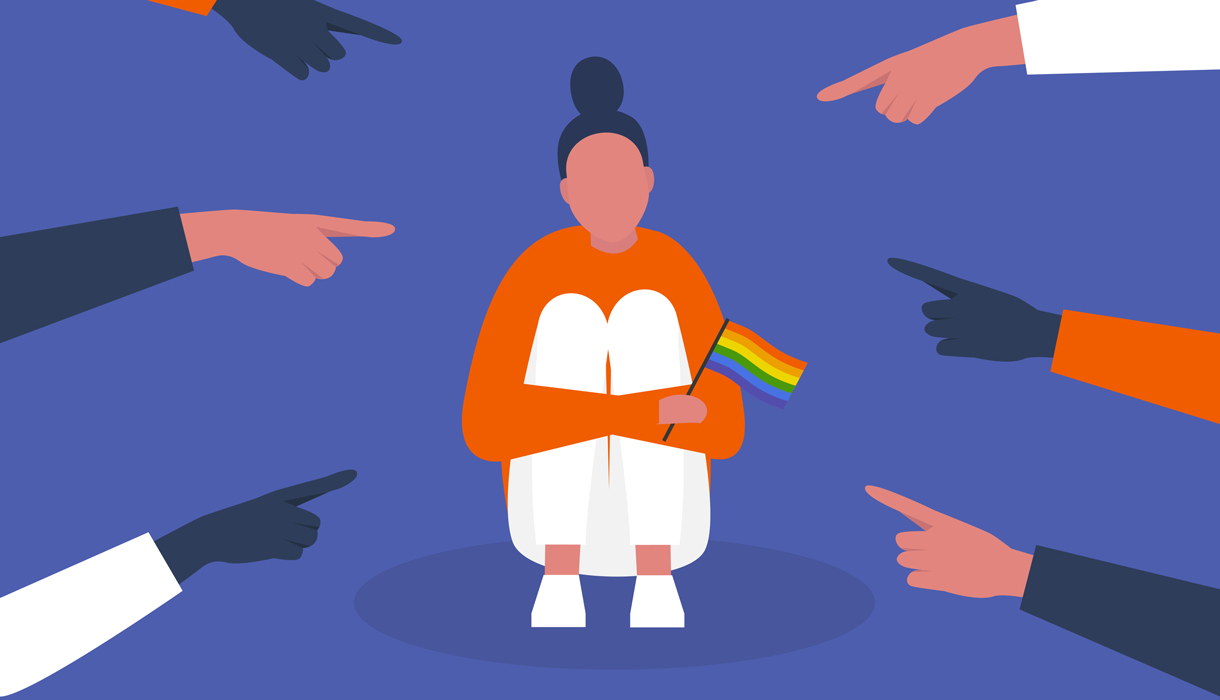
Developing a Real Sense of Pride
Shame may be stopping you from proudly celebrating your identity.

The 2021 Pride season is upon us. Rainbow flags, parades, and parties will again sweep the nation, immersing the queer community in a spirit of festivity.
But amidst all of the fanfare, many LGBTQ people will struggle to feel like proudly celebrating their identities. This year, we should allow the Pride festivities to spark a deeper examination of our relationship to self and community.
Shame: The Opposite of Pride
Shame is an emotion experienced at our core that negatively impacts our identity and our view of self. While guilt or embarrassment might make us feel bad about ourselves in the moment as the result of a specific action or behavior, shame directs us to feel negatively about ourselves in a much more pervasive way. Shame is based largely on our feeling that we have not lived up to the values that have been communicated to us through society’s messaging. It is the thought that I am a bad person who is unworthy of love or care because I do not fit neatly or cleanly into the norms or expectations that have been set out by my family, community, or culture.
Shame is also the opposite of self-acceptance, and it not only impacts how we see ourselves, but also how we view the world. Shame creates stress and strain in our relationships, and can drive us to behave in inexplicable ways in order to avoid or escape it. Shame can manifest as a lack of care or concern for ourselves and our future, making it easier to behave destructively in the present. It can cause us to feel as though we deserve negative outcomes in life with regard to family, relationships, health, and lifestyle.
While the world might tell you, “Something is wrong with you,” shame is when you actually believe it.
The Roots of Shame
Understanding the roots of queer shame can be an important step in developing one’s personal brand of Pride. Society places value on certain types of behaviors, like being heterosexual or conforming to narrow definitions of gender. These values are communicated both explicitly and implicitly, though the messaging around these values may be nuanced or even contradictory. In cases where an individual lives in a way that runs counter to society’s broader values, or if there is a specific aspect of one’s life that is highly devalued, then that person can experience discomfort and distress around self-esteem. When the gulf between identity and value is great, the space in between can be easily be filled with negative emotions—guilt, embarrassment, disgust—and shame. This shame, then, is what elevates the value of another person’s morality over your own right to freedom of thought, choice, and action.
In addition to the implicit values communicated by society through the media, there are other forces that contribute to the creation of queer shame. These forces include heteronormativity, toxic masculinity, homophobia, and trans-negativity. While it may not always be easy to identify how these forces impact our lives, we can begin to unearth the subtle and overt ways that these forces impact our way of thinking about the world by asking ourselves some relatively straightforward questions. For example, how would you complete these sentences?
“Men don’t___________”
“Women wear ___________.”
“Gay people are ___________.”
“Lesbians are ___________.”
“Transgender people are ___________.”
This thought experiment reveals how we are all impacted by the messages we receive from society. That most people can fill in many of the blanks with negative stereotypes speaks directly to just how widespread these ideas are in our society, and how those messages were firmly planted in your thinking even if you didn’t grow up in an overtly intolerant environment.
Recovering from Shame
Uprooting these types of beliefs requires that we recognize they are present. Only then can you begin the harder work of challenging them. Whenever you get a sense of shame in the pit of your stomach, ask yourself, “What is at the core of this feeling? Is there a particular voice that I’m hearing? Is there a message that I’m getting from my family, my church, or society?” A closer examination of these types of thoughts can give you clues about how best to address the origins of your shame.
It is also important to remember that becoming entirely shame-free is not a destination, but rather something that we work toward over the course of a lifetime. Shame recovery begins with moving into a space of self-acceptance.
Perhaps you can begin by paying yourself a compliment. What is one thing that you like about yourself? Can you think of any more things you like? When you look in the mirror, what is it that you see? Can you find love and compassion for that person?
Embracing all of who you are means accepting your flaws as part of your humanity. These are the things that make you a one-of-a-kind individual. Couple this with a belief that others can and will accept you, even with
your flaws.
Sadly, one of the major obstacles to accepting ourselves is the world’s constant demands to transform how we look and act. To be “happy,” we need to make more money or have a better body, a better job, or a better partner. How can we possibly withstand that type of pressure? We can begin by rejecting the notion that others know what is best for us as individuals. Who, besides you, can define what would make you whole or complete?
Pride: A Deeper Love
In addition to making plans with friends and family to celebrate Pride this year, take time to reflect on all of the ways that you can develop a deeper sense of appreciation and gratitude for the wonder that is you. The forces of shame are always conspiring against us, so actively doing this work can be one of the best ways to deepen your sense of Pride, even after the parade is over.
This article appears in the June 2021 edition of OutSmart magazine.










